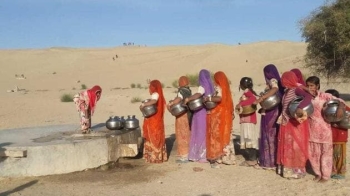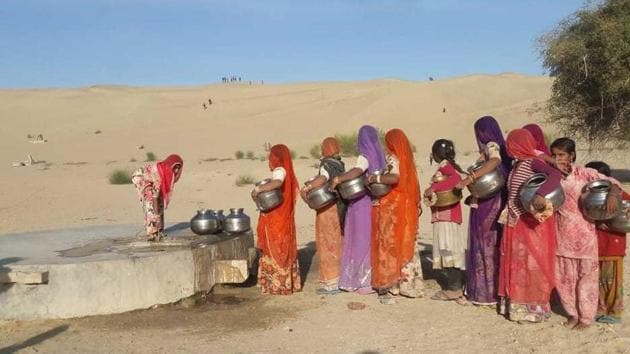
.png) Jaswant Kaur
Jaswant Kaur

Barmer in Rajasthan is in the news again. Not for the usual water shortage but something more alarming than that. So are Gujarat and Kerala. The main reason for the media attention is none other than women and the kind of treatment they are given! Let’s look at each state one by one.
To begin with, let's visit Barmer, just 125 km from the Pakistan border, visibly covered with sand dunes all over. It is a normal sight to see women walking long distances to fetch water. People dig a pit, usually 10 by 12 ft in size, to store rainwater behind their house. They call them tankas.
Gradually, this work was allotted under MGNREGA, and was essentially done by men from the same place. But no one would have known that these pits will one day pave the way to what is being called “suicide epidemic” among married women in Barmer.
Women find it easier to jump into these tankas or wells. In most cases, they jump along with their children. The district authorities have estimated around 50 such cases. In fact, the percentage of women dying in Barmer by suicide is much higher than the national average. Every year, the number of such deaths has been increasing since 2019. The pandemic worsened the situation. The administration was struggling as much to keep the virus at bay as to prevent suicides.
The authorities have sealed these wells with concrete and hand pumps were installed in around 600 of them to prevent suicides. However, the private wells were out of their purview. Despite concretisation, suicides continued. Even a small opening is enough for women to jump into these wells.
A story published in The Print laid bare the circumstances under which women get compelled to take this extreme step. The report says that “a district-wide survey by village heads and teachers listed inter-caste and extra-marital affairs, child marriages, harassment by in-laws, and domestic violence as some of the reasons for this wave of suicides. Dowry, drought and debt were also contributing factors”.
Not only this, the local media has been sensationalising these deaths, without following any ethical standards. The reports even disclosed the name and identities of these people. Cultural factors like continuous suppression of women, restrictions to speak with anyone due to age-old traditions and staunch patriarchal set-up have increased their stress levels.
The only point to which they are allowed to go is to these private wells or tankas. All these make them more vulnerable to suicides as sharing their issues and problems with someone is not allowed.
The government also started a helpline for people under the banner of Anmol Jeevan initiative in 2021. The 24-hour helpline provided counselling support to people. Besides, village officials were taught to identify people, who could take this extreme step, through a list of warning signs.
The gram panchayats were asked to concretise these tankas so that people do not get any outlet for jumping into the water. The local YouTubers were also taught to comply with guidelines while reporting deaths through suicide.
However, the helpline was stopped in October 2022. The initiative had helped in arresting the suicide rate. But it is again on the rise. In case a woman approaches her parental house for support, they are often looked down upon. The report shows how parents of a woman Mamta (name changed), who committed suicide, reacted when she sought their help. “You only marry once; it is now your responsibility. Aap jano aur aapka kaam jaane, rakho ya maro (It is your business now, keep her or kill her)”.
Another woman from the same community is quoted as saying, “Earlier, no woman died from beating by her husband or a mother-in-law. Now, they lack patience.” She is proud that she raised three daughters with “Rajputi sanskar and sahanshakti” (values and endurance).
Many would think, are we still in the 18th or the 19th Century, where women were confined to the four walls of their house, when they had no say in the decisions that affected their lives? Is this the India or Bharat that we are planning to build?
Now let’s move to Gujarat. Recently, a news-item in the New Indian Express created an uproar both in the media and the political echelons. The report showed that close to 41,000 women have gone missing during the last five years in the model state Gujarat. The data was culled from the reports published by the National Crime Records Bureau (NCRB).
The report mentioned a statement made in the State Assembly that 4,722 women went missing from Ahmedabad and Vadodara alone during the year 2019-2020. It quoted an esteemed member of the Gujarat State Human Rights Commission and a former IPS Officer. The member stated that most of these women are abducted and trafficked to other states and “forced into prostitution”.
Many of them are also sold for money. The officer also questioned the way missing cases are investigated. “The police system’s problem is that it does not treat missing person cases seriously. Such cases are more serious than murder. That’s because when a child goes missing, the parents wait for years.”
The report was picked up by many newspapers after it was published in the New Indian Express. Many questioned why a movie should not be produced on the Gujarat story in response to the support given by the government to a movie “The Kerala Story”.
The film shows the story of four women from Kerala who converted to Islam and joined the Islamic State of Iraq and Syria (ISIS). Its trailer caused a stir as it made the controversial claim that 32,000 girls were “converted” into Islamic terrorists. The film has been captioned as a real-life story. The makers have been claiming that thorough research was conducted before producing this film.
In view of the controversy, the makers changed the number 32000 to only three! Clearly the data was fudged to promote an idea that Hindu and Christian women have been exploited by the Muslims for achieving ulterior motives.
So much so that the movie was even made tax-free in a few BJP-ruled states. Was the issue raised in the movie so important that it should be promoted like this? Even if it is true that three women were converted to Islam before being used as a tool by extremist groups for promoting terrorism, should the government publicise such viewpoints, knowing full well that this could even lead to communal violence?
Meanwhile, the Gujarat police came up with an explanation for the missing women through a few tweets. While it acknowledged that 41,621 women have disappeared from Gujarat during the period 2016 to 2020 but it said that 39,467 women have returned and were reunited with their families. It says that the same figures were published by the NCRB.
Data can certainly be misleading. No one can make out whether these 41,000+ women, who went missing, and these 39,000+ women who were found, were the same women? Anyways, what is worrisome is the way the government is making fun of the real issues affecting women.
The story of Barmer or Gujarat is just a trailer. If one goes by the data published by the NCRB alone, one will find that thousands of women are trafficked every year. Many lose their lives because of gender-based violence.
What steps have the governments taken to contain such issues? The Nirbhaya fund that was established for the purpose of protecting the interests of women, remains largely unspent, almost every year. Do we have any answer to this? Is this what good governance means to the powers-that-be? It is high time to introspect and act on the promises that our elected representatives have been making for years. It is shameful that a movie has gained more importance than the real issues affecting women.